Moscow Zaporozhets - Vladimir Alekseevich Gilyarovsky
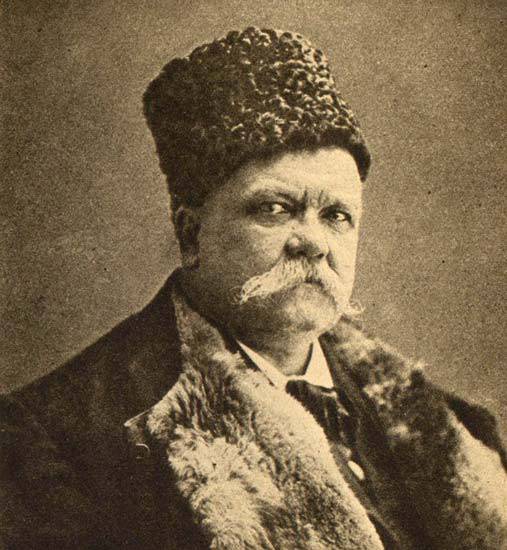
The phrase "colorful personality" can be fully applied to Vladimir Gilyarovsky. His character, appearance, manner of speaking and behaving, and indeed the whole biography was very picturesque. According to the metric book of the church of the village of Syama located in the former Vologda province, Vladimir Gilyarovsky was born on November 26 (old style) 1855 of the year. His father, Alexey Ivanovich Gilyarovsky, worked as a clerk in the estate of Count Olsufyev and, falling in love with the daughter of the estate manager, managed to obtain from her father, a hereditary Zaporozhets, consent to the marriage. The boy’s childhood years were spent in the Vologda forests. When Vladimir was eight years old, his mother Nadezhda Petrovna died. Soon, Alexey Ivanovich moved with his son to Vologda, found a job there, and after a while got married again.
The stepmother accepted Volodya as a child, the situation in the house was benevolent, but the boy, who was accustomed to a free and free life, had difficulty adapting to the new conditions. In particular, he was not given good table manners and diligence in his studies. The guy grew up desperate naughty boy, preferring to spend all his time on the street. Once he painted the yard dog with his father's paint of golden color, for which he was mercilessly flogged. Another time, a young tomboy poured from a roof of a gazebo onto the heads of unsuspecting passersby a bucket of caught live frogs. The idol of Vladimir was a retired sailor living nearby who taught him gymnastics, swimming, horseback riding and fighting techniques.
In the fall of 1865, Vladimir enrolled in the Vologda gymnasium and managed to stay in the first grade for the second year. A considerable role in this was played by the bold epigrams and poems written by him on the teachers, who enjoyed great popularity among the children. It is worth noting that Gilyarovsky easily mastered French, his translations were rated very high. During his studies, he also intensively studied circus crafts - acrobatics and dzhigitovka. And when a circus stopped in their city, the boy even tried to get there, but he was refused, saying that he was still small.
At sixteen, Gilyarovsky ran away from home, scribbling a note: “I left for the Volga, I’m going to get a job, I'll write.” In the unknown world, Vladimir set off without money and a passport, with only one firm confidence in his own abilities. Having traveled two hundred kilometers on foot from Vologda to Yaroslavl, he hired himself at the Burlatzian artel. At first, the barge haulers doubted whether to take the boy, but Vladimir, who possessed tremendous physical strength, pulled a nickle out of his pocket and easily turned it into a tube. So the question was resolved. For twenty days, he pulled on a common strap. When he reached Rybinsk, Gilyarovsky worked for a while with a hooker and a herdsman, then hired as a porter, but due to inexperience he broke his ankle, being in a foreign city without a penny in his bosom. Having conquered pride, I had to write home. Alexey Ivanovich came to him and, having scolded him, gave money, punishing the unprofitable son to return back to Vologda and continue his studies.
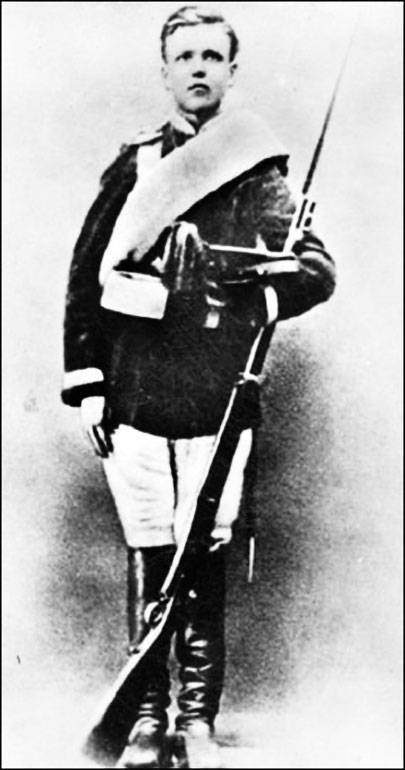
V.A. Gilyarovsky - Junker. Xnumx
Vladimir never got to the house - on the ship he met an officer and, following his persuasion, went to serve in the Nezhinsky regiment. The service there seemed to him not difficult - on the sports field and the parade ground the strongman Gilyarovsky surpassed everyone. Two years later, in 1873, he was sent to Moscow to the Junker School. In the city, he fell in love at first sight. However, there was no time to study it, iron discipline reigned in the school, training began early in the morning and lasted until the evening. Once, being in dismissal, he picked up an abandoned baby on the street. Hearing a number of offensive nicknames upon returning to his address, Vladimir, without hesitation, got into a fight. For violation of discipline he was expelled back to the regiment. However, Gilyarovsky did not want to leave Moscow, spitting on everything, he filed a resignation report.
Year he roam around the capital, and then went to the Volga. The future writer worked now as a stoker, now as a fireman, now as a watchman, even acting as a circus rider. After long wanderings in 1875, he ended up in the Tambov Theater. Got, by the way, in a very original way - by standing up for the actors during a fight in a local restaurant. New friends recommended him to the director, and a day later he first appeared on the scene in the play “Inspector” in the role of the policeman Derzhimordy. Together with the theater, he visited Voronezh, Penza, Ryazan, Morshansk. On tour in Saratov, Vladimir moved to the summer theater of the Frenchman Servier. The well-known actor Vasily Dalmatov spoke about him: “Young, happy, cheerful and lively, with all the ardor of youth, devoting himself to the stage ... With extraordinary strength, he captivated others with a noble soul and his athletic exercises.”
The outbreak of war with Turkey interrupted Gilyarovsky's theatrical career. As soon as the recording of volunteers had just begun, the writer already in the rank of volunteer was driving to the Caucasian front. There he was sent to the 161 Alexandropol regiment in the twelfth company, but after some time he joined the hunting squad. Thanks to his abilities, Vladimir Alekseevich very quickly found himself in the ranks of the military elite - intelligence.
For a whole year, he went on dangerous assignments, repeatedly caught and brought Turkish soldiers to his unit, was awarded the medal "For the Russian-Turkish War 1877-1878" and the Military Order of St. George the Fourth Degree. During this period, Gilyarovsky had time to write poems and sketches, corresponded with his father, who carefully kept all correspondence. When the warring powers made peace, he returned to his native Vologda as a hero. His father gave him a family snuffbox, but reconciliation did not happen. In one of the disputes, Vladimir in the hearts tied the poker in a knot. Aleksey Ivanovich flared up with the words: “Do not damage property!” - untied it back. The trip ended up short, Gilyarovsky went to the Penza Theater, where his friend Dalmatov performed.
Traveling on tour, he continued to write poems, and soon began to master and prose. He himself said that the famous actress Maria Yermolova had blessed him on writing. After listening to his stories about travels in Russia, she said: “You can’t see and not write so much!”. In 1881, Gilyarovsky again found himself in Moscow, working at the Anna Brenko Theater. Acquainted with the editor of the magazine "Alarm Clock", he read him his poems about Stenka Razin. Soon they were published. “It was the most amazing moment in my adventure-rich life,” said Gilyarovsky. “When I, not so long ago, the passport-free tramp, who had not once stood on the verge of death, looked at my printed lines ...”
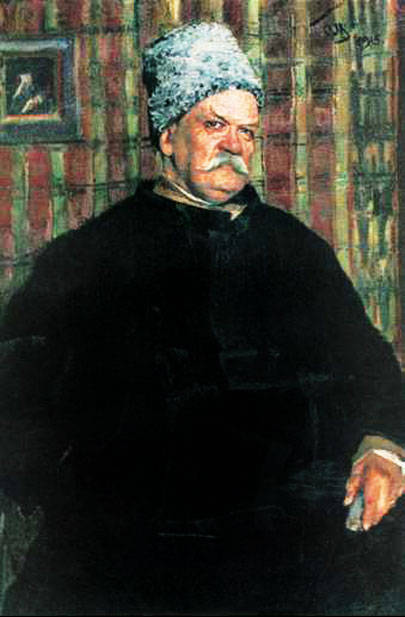
S.V. Malyutin. Portrait of V.A. Gilyarovsky
In the fall of 1881, Vladimir Alekseevich finally broke up with the theater. He also didn’t linger at the Alarm Clock, having switched to 1882 in the Moscow leaflet, founded by the quick journalist Pastukhov, printing the most scandalous city news. Shepherds were extremely scrupulous about the veracity of the material published in his newspaper. From his reporters, he demanded that their information be extremely true. Quickly assessing the talents of Vladimir, Shepherds appointed him chief assistant with a salary of five kopecks per line. It was Shepherds who became the first teacher and mentor of Gilyarovsky, introducing the various inhabitants of Moscow, the world of vagrants, criminals and beggars, and official police representatives. Gilyarovsky wrote: "I rushed with him all over Moscow, across all the taverns, collecting all sorts of gossip."
In those years, the reporter was the only source of fresh news, performing the functions of modern television. Gilyarovsky is rightfully considered the pioneer of hot reporting, both literally and figuratively. Despite his young age, Vladimir Alekseyevich had a solid life experience, which helped him a lot in his work. He repeatedly risked his life, for example, by taking part in extinguishing Moscow fires, appearing alongside his duties as a reporter. Despite the fact that he had a lot of friends among the innkeepers, watchmen, handicraftsmen, stationery scribes, firefighters, slum dwellers, hotel workers, he always preferred to be personally present at the scene. He even had a special permit that allowed him to move on carts with firefighters.
Gilyarovsky’s lifestyle was very tense: “I have breakfast at the Hermitage; at night, in search of material, I wander through Khitrov’s market hangouts. Today, on the instructions of the editorial board, at the governor-general's rout, and tomorrow I’m going to look around Zadonsky winterers, herds noticed by the snow ... In the Bolshoi Theater Rubinstein conducts the next performance of The Demon, the whole of Moscow is present in diamonds and clothes, I will describe the situation solemn performance. In a week I will go to the Caucasus, and in a month to St. Petersburg, to meet with Gleb Ouspensky in his apartment on Vasilyevsky Island. And then again on the courier train, to rush around Moscow again to catch up with the past weeks. ”
Over the year, Vladimir Gilyarovsky made a dizzying career, becoming one of the best metropolitan reporters. He not only perfectly studied history Moscow, he knew everything that the modern city lived in - geography, architecture, high society and the lower strata of society living in the Khitrovka district: “I had acquaintances everywhere, people who informed me about everything that happened: slum dwellers, scribes in the police , the watchman at the stations. The poor also knew and sympathized well with the writer. It was very difficult to earn the trust of embittered Bosok, beggars, criminals. He paid off someone, he influenced others with his charisma, or he simply took impudence. But above all, his success ensured complete courage, honesty, kindheartedness and tremendous endurance. He liked to set ordinary city dwellers as heroes of his essays, wrote about their meager earnings, about the poor state of capital charities, about fighting drunkenness, about the misfortunes and unhappiness of individual families and many other social problems. In addition, he managed to bring all the boldness and sweepingness of the Russian soul into his stories. In search of curious plots, he walked tremendous distances every day, visited the most dangerous hangouts of the city, waited patiently for an interview for hours.
In 1882, he spent fourteen days in a tent near a terrible train crash near the village of Kukuyevka. Here, as a result of the erosion of the soil, seven cars collapsed under the railroad tracks and were filled up with liquefied soil. The very next day, Gilyarovsky illegally, hiding in the toilet of a car of a service train, entered the area cordoned off by the troops, and then joined a commission whose members did not really know each other. Despite officials' attempts to “shut up” what happened, he informed the readers of the Moskovsky Leaf about the progress of the rescue operation. By his own admission, the journalist, after two weeks at the scene of the accident, suffered from a sense of smell disorder for six months and could not eat meat. After these reports, he got his most famous nickname - "the king of journalists." Bogatyr physique, in the picturesque Cossack hat, he became a living symbol of Moscow. Expressing sincere appreciation and recognizing their own, Muscovites began to dignify him as "Uncle Gilyam."
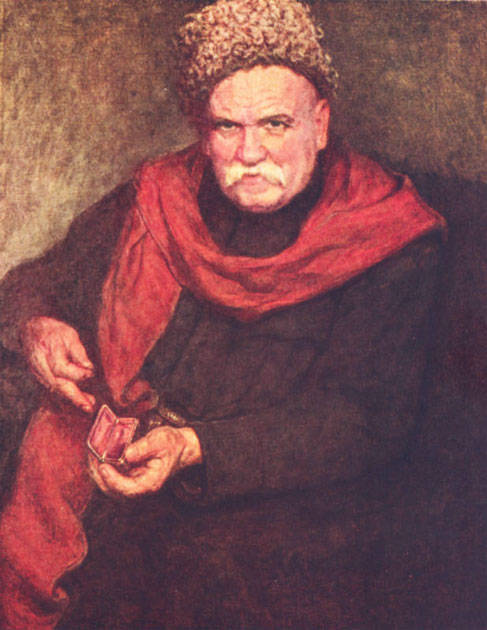
N.I. Strunnikov. Portrait of V.A. Gilyarovsky
In the less than thirty years (in 1884), Vladimir Alekseevich married a teacher, Maria Ivanovna Murzina, and lived with her until the end of his life. Since 1886, the couple lived in an apartment located in Stoleshnikov Lane in the house number 9. In the summer, they rented a cottage in Bykov or in Kraskov. Vladimir himself rarely lived in country houses, mostly on short visits, but during this time he managed to find interesting stories in the Moscow region. A year after the wedding, the couple had a son, Alyosha, who died in infancy, and one more year later, her daughter Nadezhda, who became a popular theater critic. Silent and taciturn, Maria Ivanovna had her own talents — she drew beautifully and was a wonderful story-teller, though lost in the background of her loud and restless husband. They seldom quarreled, but she had to get used to many things. In particular, to the fact that his friends lived in their house very often, or that the spouse could suddenly disappear and only a few days later send a telegram from somewhere in Kharkov.
With the advent of Maria Ivanovna, Gilyarovsky’s circle of acquaintances began to change. Decent people began to crowd out the old reporter and theatrical chantrapus. The first were Feodor Shalyapin and Anton Chekhov, who also began his career as a journalist. Anton Pavlovich wrote about Uncle Gilyai: "This is a very restless and noisy person, but at the same time he is simple-minded, pure in heart ...". After his trip to Melikhovo, Chekhov complained in a letter: “Gilyarovsky was visiting with me. My God, what did he do! I climbed trees, drove all the horses, broke logs, showing strength ... ". Uncle Gilyai's good acquaintances also included Bunin, Kuprin, Bryusov, Blok, Yesenin, Stanislavsky, Kachalov, Savrasov, Repin, and many, many other no less famous contemporaries. The writer was a member of the Society of lovers of Russian literature, was the founder of the first national gymnastic society, as well as the honorary firefighter of Moscow. On the life of Vladimir Alekseevich preserved a lot of memories. Some of them perfectly demonstrate what an extraordinary person it was. One day, for example, he sent a letter to a fictional address in Australia only to later trace how long and confusing it traveled the world before returning back to the sender.
In 1884, Gilyarovsky moved to the Russian Vedomosti, where the best Russian writers worked - Dmitry Mamin-Sibiryak, Gleb Uspensky, Leo Tolstoy. Under their influence, the formerly apolitical “Uncle Gilyay” began to criticize the tsarist regime, and his book “Slum People”, written in 1887, turned out to be so revealing that the entire edition was burned in the courtyard of Suschevskaya police station. In response, Vladimir Alekseevich organized the “Journal of Sport”, characterized in that portraits of members of the royal family were never printed in it. When asked about this, Gilyarovsky replied: "Sorry, but they are not prize-winning stallions!"
And then Khodynka struck - a massive crush on the coronation of Nicholas II in the spring of 1896. In the crowd, Pruszcz, behind the worthless goodies, there was also “Uncle Gilyay”. He survived only by a miracle - having decided that he had dropped his father’s snuffbox, he made his way to the edge of the crowd, just before people began to choke and turn blue. He found the snuff box in his back pocket; she was truly happy. A report he read every other day about what happened was read by all of Russia. It was the only article in the Russian (and world) press that told the truth about the tragedy.
It is worth noting that the work of "Uncle Gilyai" has never been the usual pursuit of sensation. As a result of his investigations, the authorities often turned their attention to problems. In 1887, Gilyarovsky’s voluminous article entitled “Catching Dogs in Moscow” was published, shedding light on the conditions in which captured stray and feral dogs are kept, as well as on flourishing outrage, encouraging the kidnapping of purebred dogs. It was the first newspaper article raising the topic of stray animals in the capital.
From the work of journalism, he gradually departed, more and more engaged in writing. He read a lot: for work - statistical reports, magazines and guidebooks, for the soul - classics. Especially loved Gogol, and from contemporaries of Maxim Gorky, with whom he was personally acquainted. At home, Gilyarovsky had an entire library that occupied a separate room. Over the years, he turned into a genuine landmark in Moscow, he was represented by visitors, and Vladimir Alekseevich himself spoke out of the house a couple of hours before the appointed time, in order to have time to say hello and chat with his countless acquaintances. He supported many of them - both in the search for truth, and just with things and money. In 1905, when students were on strike, Gilyarovsky sent baskets of rolls to the rebels. He could jump out of the tram on the move to give money to a friend of the poor.
Nikolai Morozov, an errand boy beaten to the writer, who later became his biographer and secretary, recalled: “In the morning an unknown peasant woman could come into his apartment with a basket of eggs in her hands. “Yelerovsky,” she asked. It turned out that the writer on the eve helped her buy a cow. From what village she is and how Gilyarovsky got there - no one was interested in this at home, it was a common occurrence. ”
Remembering the most famous reports of Gilyarovsky, it is impossible not to mention his story about the terrible hurricane that swept through the capital in 1904 year. June 16 whirlwind flew in the direction of the Yaroslavl highway from Karacharovo to Sokolnikov, leaving behind a huge destruction and human casualties. Vladimir Alekseevich noted that “fortunately” was in the very center of the whirlwind. The circulation of the newspaper with a report broke all records - almost one hundred thousand copies were sold. Many plots in Gilyarovsky was associated with the railway. His essay "In a Whirlwind" was widely known, when in December 1905, Vladimir Alekseevich was on the train, on which the engineer SR, Alexei Ukhtomsky, took out of the capital under fire from government troops. His story on behalf of railway worker Golubev about the punitive expedition of officers Riemann and Ming on the Moscow-Kazan railway is devoted to the same events. The story was published only in 1925, this publication is a model of unbiased and honest journalistic coverage of events.
He walked year after year, "Uncle Guilay" was growing imperceptible. In 1911, he fell seriously ill for the first time in his life. It was pneumonia, however, frightened, the writer thought about collecting his legacy scattered through newspapers and magazines. He agreed with the famous publisher Ivan Sytin to release the collected works in six volumes, but this was never carried out - the war prevented it.
At the beginning of the First World War, a book of poems was published by Vladimir Alekseevich, the fee from which Gilyarovsky donated to the fund to help the victims of war and wounded soldiers. Illustrations for the collection were created by Repin, Serov, the Vasnetsov brothers, Malyutin, Nesterov, Surikov. The fact that so many exceptionally famous people have rallied to create a book speaks of the respect they had for “Uncle Guilay.” The writer himself was often interested in painting, supported young artists, buying their paintings. In addition to financial assistance, Gilyarovsky gladly wrote about the art exhibitions held, showed the purchased pictures to friends and acquaintances, predicting their authors fame. Artists answered him with the same warm feelings. In addition, the pictorial image of the writer, and begged on the canvas. Gilyarovsky wrote Shadr, Strunnikov and Malyutin. Vladimir Alekseevich posed for Repin while creating his famous painting “Zaporizhzhya Cossacks writing a letter to the Turkish Sultan”. You can recognize him in a laughing Cossack in a white fur hat. Portraits of Gilyarovsky and his family members were also written by Gerasimov, whose writer was a frequent guest at the dacha. None other than Gilyarovsky created the image of Taras Bulba, the sculptor Andreev, whom he needed for the bas-relief on the monument to Nikolai Gogol.
Gilyarovsky accepted the revolution that took place enthusiastically. He could be seen walking around Moscow in a “commissar” leather jacket with a red bow. The Bolsheviks did not touch “Uncle Gilyai”, but they did not hurry to accept it. In addition, life has changed - most friends left the capital, many public institutions were closed, the streets received new names. Preferring to live in the past, the old man immersed himself entirely in the study of the history of Moscow, collecting various trivialities of life bit by bit. Of course, his seething nature was not satisfied with one desk job. He walked through the editorial offices, told young journalists how to write, raised questions of the professional ethics of reporters. Konstantin Paustovsky recalled his words: “He must be struck from a newspaper sheet with such heat that it was difficult to hold him in his hands!”. Gilyarovsky's works were now published in new editions: Ogonek, Artistic Work, Krasnaya Niva magazines, and Evening Moscow, Izvestia, and V shift. From 1922 to 1934, his books were published: “Stenka Razin”, “Notes of a Muscovite”, “Friends and Meetings”, “My Wanderings” and some others. Gilyarovsky’s popularity did not weaken, the works written by him did not lie long on the shelves. The most famous work of Gilyarovsky is the book “Moscow and Muscovites” released in 1926 year. It truthfully and in detail shows the life of the capital of the period 1880-1890-s, told about all the interesting and curious, available in Moscow at the time. The pages of the book describe slums, taverns, markets, streets, boulevards, as well as individual people: art, officials, traders and many others.
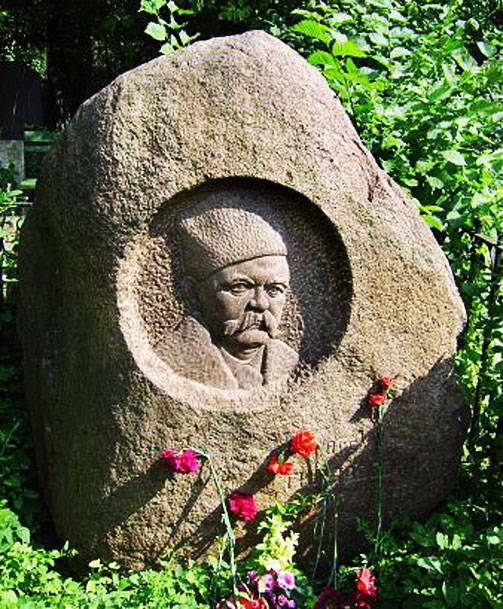
Tomb of Gilyarovsky
In 1934, Gilyarovsky’s eyes became inflamed and were removed. The courageous writer turned it into another joke - right in the middle of a conversation with an unknowing interlocutor, he took out a glass prosthesis from his eye socket with the words: “Few people can look at themselves from the side”. In 1935, Vladimir Alekseevich was eighty years old. He was almost blind, deaf, but still wrote on his own, folding the sheets of an accordion so that the lines wouldn’t climb over each other: “And my work makes me young and happy - me, outdated and living ...”. The writer admired the transfiguration of Russia and especially the reconstruction of Moscow, the discovery of the metro. He wanted to ride it, but doctors did not allow it. On the night of October 1, Gilyarovsky died, he was buried in the Novodevichy cemetery. Through the years, the sculptor Sergey Merkulov fulfilled the promise made to “Uncle Gilyuyu” before the revolution by installing a monument in his grave in the form of a meteorite that fell from the sky - a symbol of the unstoppable nature of the Moscow Zaporozhets.
Based on the books: E.G. Kiseleva "Stories about Uncle Gilyae" and A.G. Mitrofanova "Gilyarovsky"
Information